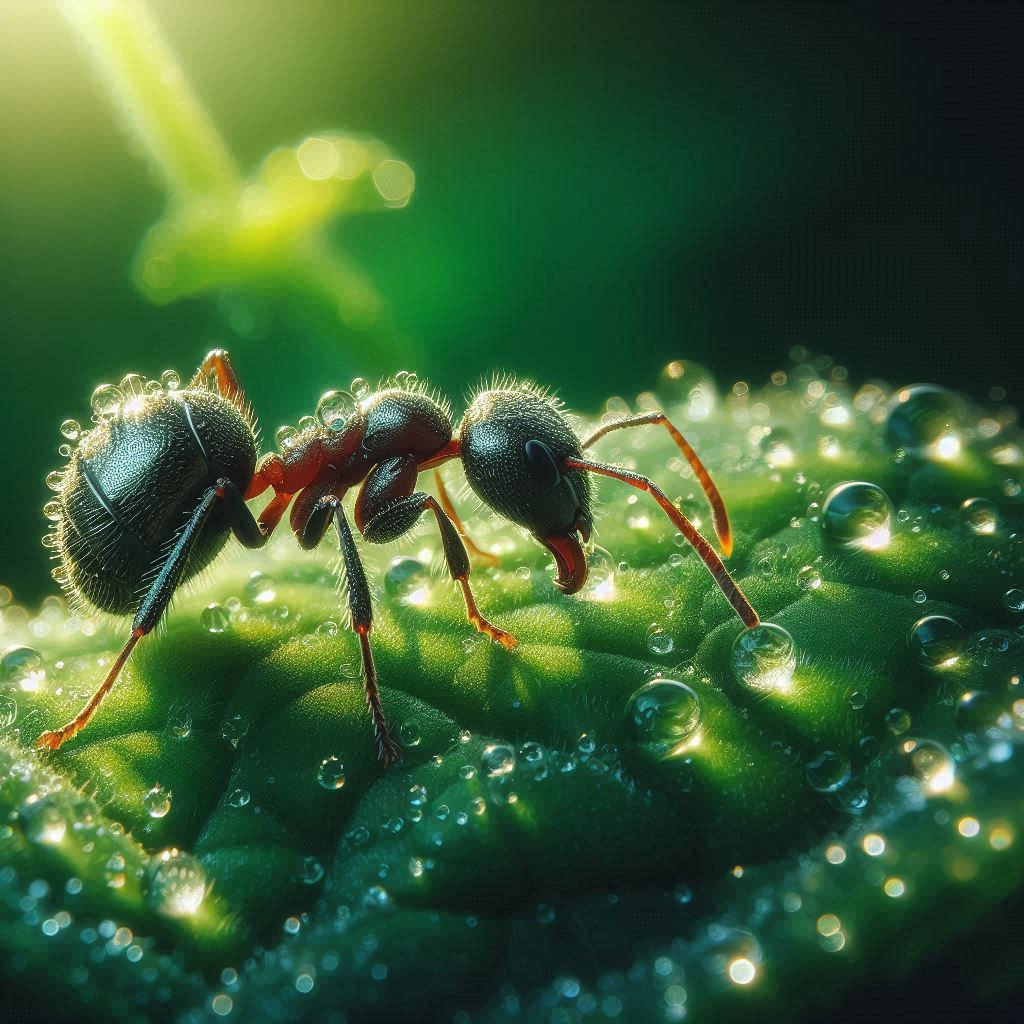How to Get Rid of Ants in the Garden Without Harm | 2024 Guide
Are you tired of finding little black ants marching through your garden like they own the place? Fear not! In this 2024 guide, we’ll explore effective and natural ways to get rid of ants in the garden without causing any harm. Let’s dig into the world of ants and discover the best pest control methods to keep your garden thriving!
What Are the Common Types of Ants in the Garden?
Identifying the Type of Ant Infestation
Before we dive into the solutions, it’s essential to identify the type of ant infestation you’re dealing with. There are various species of ants that might invade your garden, from the harmless little black ants to the more concerning carpenter ants. Each type of ant has its own unique behavior and impact on your garden. To effectively manage your ant problem, you need to recognize the specific characteristics of the ants in your garden. Look for their nests, the size of the ants, and their trails. This will give you clues about how to best repel ants.
How Different Types of Ants Affect Your Garden
Different types of ants can have varying effects on your garden. For instance, while some ants are merely a nuisance, others can cause significant damage. Fire ants can be particularly aggressive, while carpenter ants, known for their wood-nesting habits, may weaken structural integrity if they decide to make a home in your wooden garden structures. On the flip side, certain ants can actually help your garden by preying on harmful pests. Understanding how ants live and interact with your plants is crucial in deciding how to manage their presence.
Are Carpenter Ants Harmful to Plants?
Ah, the carpenter ant! Often mistaken for a harmless visitor, these ants can create quite the havoc if they establish a nest near your garden. They don’t eat plants directly but may tunnel through wood, which can be detrimental if your garden features wooden planters or structures. So, yes, carpenter ants can be harmful to your garden indirectly by compromising the structural integrity of items that may support your beloved plants. If you see carpenter ants in your garden, it’s time to take action to prevent them from turning your garden into their personal playground.
What Are Effective Ways to Get Rid of Ants in the Garden Naturally?
Using Diatomaceous Earth as a Natural Ant Control
Diatomaceous earth is a fantastic, natural way to get rid of ants without resorting to harsh chemical insecticides. This fine powder consists of fossilized algae, and when ants crawl through it, the powder scratches their exoskeleton, leading to dehydration and death. To use it effectively, sprinkle diatomaceous earth around the ant nests and trails. Just be sure to reapply after rain or watering, as water can wash it away. Trust me, this method will keep ants away without harming your plants or the environment.
How to Create a White Vinegar Repellent Solution
Another effective way to repel ants is by creating a simple white vinegar solution. Mix equal parts of white vinegar and water in a spray bottle, and voila! You have a natural ant repellent. Spray it directly on the ants you see and along their trails. The strong scent of vinegar disrupts their pheromone trails, making it harder for them to find their way. Plus, it’s a great way to keep your garden clean and free from unwanted pests. Ants won’t cross this barrier, ensuring your plants remain unharmed.
Benefits of Using Boric Acid in Ant Control
Boric acid is another potent weapon in the fight against ants. When used correctly, it can be an effective way to kill ants without risking harm to your garden. Mix boric acid with sugar water to create a bait that attracts worker ants. Once they consume the bait, they’ll return to their nest and share it with the colony, ultimately leading to the demise of many ants. Just be cautious with this method, as boric acid can be toxic to pets and wildlife if ingested in large quantities. Use it thoughtfully to manage your ant population while keeping your garden healthy.
How Can You Prevent Ants From Entering Your Home?
Identifying Entry Points for Ants in Your House
Preventing ants from entering your home is just as important as controlling them in the garden. Start by identifying entry points where ants might crawl in. Common areas include gaps around windows, doors, and even tiny cracks in the foundation. Seal these entry points with caulk to keep ants from invading your space. You’ll find that a proactive approach can significantly reduce the chances of encountering house ants wandering into your kitchen looking for a snack.
Tips to Keep Ants From Crawling Inside
Keeping ants out of your home involves more than just sealing cracks; maintaining a clean environment is key. Ensure that food is stored in airtight containers, and promptly clean up spills and crumbs. Ants are attracted to food sources, so the less they find, the less likely they are to enter your home. If you do see ants in your house, use the white vinegar solution or a spray bottle filled with water and soap to eliminate them immediately. Here’s how to get rid of those pesky invaders before they make themselves at home!
Maintaining a Clean Garden to Deter Ants
Just as a clean home can deter ants from entering, maintaining a clean garden can prevent an ant infestation. Clear away debris, fallen fruits, and other organic matter that might attract ants. Regularly check your plants for aphids and other pests that could lure ants seeking a sweet meal. By keeping your garden tidy and healthy, you create an environment that is less inviting to ants, ensuring they stay where they belong: outside.
What Are the Harmful Effects of Ants in the Garden?
Understanding How Ants Can Harm Your Plants
While some ants may be beneficial, others can pose risks to your plants. For instance, ants often farm aphids for their honeydew, which can lead to severe infestations. These pests suck the sap from your plants, leading to stunted growth and a decline in plant health. It’s essential to monitor your garden for ant activity and the presence of aphids or other pests, as this can indicate a problem that needs addressing.
Do Ants Eat Garden Vegetables or Flowers?
While you might think ants in the garden are after your vegetables or flowers, they typically don’t eat them directly. However, their presence can signal other problems, such as aphid infestations that damage your plants. So, while ants won’t munch on your tomatoes, their activities can certainly lead to harm. Learning how to get rid of ants effectively will help safeguard your garden from these unintended consequences.
The Role of Ants in the Garden Ecosystem
Despite the nuisance they can sometimes cause, ants do play a role in the garden ecosystem. They aerate the soil, help decompose organic matter, and even prey on harmful pests. Understanding this balance is crucial; while you may want to repel ants, it’s essential to consider their positive contributions. A healthy garden can often tolerate a few ants, but if their population becomes overwhelming, it’s time to act decisively.
What Pest Control Methods Can You Use for Ant Infestation?
Comparing Chemical Insecticides vs. Natural Remedies
When dealing with an ant infestation, you might be tempted to reach for chemical insecticides. However, it’s worth weighing the pros and cons of chemical methods versus natural remedies. Chemical insecticides can be effective, but they pose risks to beneficial insects, pets, and even your garden's health. Natural remedies, like diatomaceous earth and vinegar, may take longer to yield results, but they are safer and more environmentally friendly. Here’s how to get rid of ants without compromising the integrity of your garden.
How to Use a Spray Bottle for Targeted Ant Control
A spray bottle can be your best friend in targeted ant control. Whether filled with water and soap, vinegar, or a mix of natural repellents, it allows for precise application. Aim for the areas where you see ants the most, and be diligent about following up. A little persistence goes a long way in keeping ants at bay. Plus, it’s a satisfying way to eliminate ants without resorting to harmful chemicals.
Long-Term Strategies to Manage Ant Populations
To truly manage ant populations effectively, consider implementing long-term strategies. Regularly inspect your garden for signs of ant activity, and act quickly when you see them. Combine different methods, such as using diatomaceous earth with vinegar solutions, to create a more robust defense against these garden pests. By maintaining cleanliness and vigilance, you can keep ants away and allow your garden to flourish in peace.

